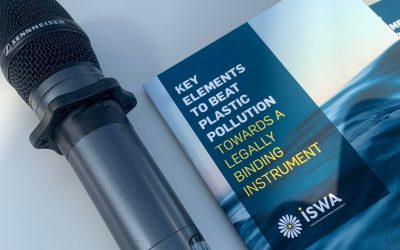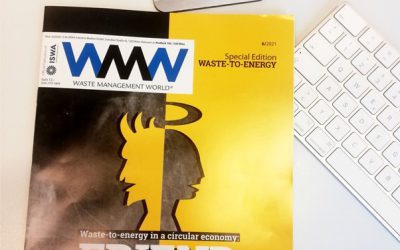
Get Involved
Get Support
The ISWA TFCD is an international partnership that is led and facilitated by ISWA, aiming to close dumpsites throughout the world. ISWA TFCD will accomplish this via site visits, scientific research, and capacity building workshops using ISWA experts and its international network to facilitate this work. The Task Force will propose best practice solutions for effective waste and resource management for affected communities and use this project as an initial step to facilitate funding for larger scale projects of dumpsite closure. The ISWA TFCD was established after formal approval of the Terms of Reference in June 2018.
Recent publications
Activity Update
The TFCD is currently working on finalizing the Closing Dumpsites Tyre project. The project is a collaboration between the TFCD and the Climate and Clean Air Coalition (CCAC) on mitigating short-lived climate pollutants (SLCPS) from landfills and municipal solid waste. The goal of the initiative is to enable cities, with the support of their regional and national governments, to move along the waste hierarchy in a coordinated and cohesive manner in order to mitigate methane and black carbon emissions. Expected deliverables are a report on communications and disseminations strategy and a three day capacity building and training workshop for the officials and decision makers from the municipality of Tyre and surrounding municipalities.
In addition, the TFCD is working on a kind of FAQ section for the closing dumpsites website, that should provide municipalities and other stakeholders with the information they need to take next steps in closing dumpsites.
Dumpsites: A Global Waste Emergency
More than 750 people died because of poor waste management at dumpsites in the first half of 2016 alone. Dumpsites are a global health and environmental emergency. Dumpsites receive roughly 40% of the world’s waste and serve 3-4 billion people. The 50 biggest dumpsites affect the daily lives of 64 million people, a population the size of France. As urbanisation and population growth continue, several hundreds of millions more people will be served by dumpsites, mainly in lower-income countries. If the situation follows the business as usual scenario, dumpsites will be generating 8-10% of manmade greenhouse gases by 2025.
- QUICK WINS
The first immediate steps to closing down dumpsites can have quick positive effects on the environment by reducing contamination and improving health and safety for those that live near them. Read more ….
- SUSTAINABLE DEVELOPMENT GOALS
The proper management of dumpsites can easily be linked to and contribute significantly to sustainable development goals both directly and indirectly.
- IMPACTS
Open dumpsites can have large negative impacts on the local economics and society as well as the health and safety of the people living around them. Read more ….
Let’s Close the World’s Biggest Dumpsites!
Dumpsites spread pollutants across our atmosphere and our oceans, they damage the health and violate the human rights of the hundreds of millions of people who are living on or around them. That is why, over the coming years, closing dumpsites will be a top priority of ISWA. ISWA will set clear examples of how to close dumpsites in a sustainable manner and offer support and help to countries and cities looking to take the positive step to do so. This website aims to be a resource hub not only to those looking to close dumpsites, but to all stakeholders who share our goal to #closedumpsites
ISWA & the Sustainable Development Goals
Over the last 12 months, following discussions in several conferences and ISWA meetings, we came to a simple but important conclusion:
The best way to advance the new UN Sustainable Development Agenda that has been adopted by 193 countries is to resolve the waste management problems that exist, largely in the developing world.
Some of our first ideas on how to tackle these have been presented in the Roadmap Report, and we are very pleased to share with you our new video that visualizes ISWA’s contribution to achieve the 17 Sustainable Development Goals (SDGs) identified by the UN Agenda. (see the video to the right).
If no action is taken, dumpsites will account for 10% of Greenhouse Gas Emissions by 2025. Therefore closing dumpsites is one of the ways in which we can move towards meeting the sustainable development goals.
How can you get Involved?
Our declaration calls for the closure, as soon as possible, of the world’s 50 largest dumpsites. It also demands the closure of all dumpsites by 2030.
3. PROVIDE CASE STUDIES
We need more examples & case studies of successful dumpsite closures. As part of our objective to support dumpsite closures, we aim to consolidate as many examples into our knowledge base in order to assist cities in finding proper, long term safe and sensible solutions.
4. ISWA SCHOLARSHIP PROGRAMME
ISWA is #tradingtrashforeducation by preparing and educating next generation youths who would otherwise follow their parent’s footsteps into working on the dumpsite. The ISWA Scholarship Programme has, until now, taken 45 children away from sorting trash in the dumpsites of Nueva Vida and La Chureca in Nicaragua and is providing them with a sustainable, long-term education.
Support ISWA’s Initiative: Donate Now!
ISWA’s goal is not only to play an active part in the closure of dumpsites, but also to ensure that the final closure of a dumpsite is supported by a system of infrastructure, by putting more sustainable alternatives in place, together with an integrated waste management plan, institutional and administrative capacity, financial resources and social support for the people living on the dumpsites.
ISWA will therefore support municipalities and governments, who are looking to make the positive step towards closing dumpsites in favour of more sustainable alternatives, in all of these matters.
Closing the world’s dumpsites is not just about fixing waste problems, it is a matter of protecting public health and our environment, improving the quality of our lives and making the world a better place to live.
Now is the time to work together, to protect people’s livelihoods and the environment they depend upon.
Your support, no matter what amount, is very much valued. We will publish a list of all donors on this website and promise to keep you updated on the progress of our initiative via blog posts, letters and email. Thank you for supporting our efforts!
#CloseDumpsites in the Press
Our campaign is gaining traction and has been featured in large number of specialist and international media over recent weeks. If you’re interested in reporting on our #closedumpsites initiative, please get in touch with us for interviews, pictures or any other stories.
ISWA’s Helpdesk, Coming Soon
ISWA is setting up a helpdesk. This will take a little longer, we appreciate your patience whilst we work on this! In the meantime, here are some other ways we can support you:

ISWA has an extensive selection of literature which can help inform you and other stakeholders on the benefits and methods to closing down dumpsites.

CASE STUDIES
We are also in the process of putting together an extensive compilation of case studies which will serve as a valuable resource for those seeking assistance.

JOIN THE DISCUSSION
Closing dumpsites can lead to many challenges, but there are many experienced people willing to help in overcoming them. We will soon establish a forum for discussions on this.

FAQ’S
Closing dumpsites can lead to many challenges, but there are many experienced people willing to help in overcoming them. *Coming Soon*
ISWA’s Roadmap
Closing down a dumpsite is neither a simple nor an easy task. It requires an alternative waste management system, so it requires adequate planning, institutional and administrative capacity, financial resources, social support and finally political consensus. All of these conditions are really difficult and sometimes impossible to be met in countries where dumpsites are the dominant method of waste disposal and level of governance quality is questionable.
The report “A Roadmap for closing waste dumpsites” provides the guidance required, to each and every local authority or government, for the process and procedures required to close a dumpsite and develop an alternative sound waste management system.
The roadmap is available in three different versions, a long version, comprehensive summary and short folder, all of which you can read onlin and download.
Case Studies
Over the coming months and years ISWA will be compiling an extensive collection of case studies on dumpsite closures. Our campaign demands the closure of dumpsites, but this must be done properly in a sustainable manner with maximum societal benefit. As more and more dumpsites are closed, we will report on them here and provide you with the know-how in order to assist you with such projects.
Whilst currently limited, we hope to be able to provide you with more in the future as our campaign progresses.
We urge you to get in contact if you have any case studies or examples of dumpsite closures in your region.
Like the knowledge base, some items may require you to login to the ISWA Knowledge Base to download the article.
|
Title |
Source / Link |
Year/Country & Type |
|---|---|---|
|
Waste Management Outlook for Mountain Regions – Sources and Solutions |
2016 / Mountainos Regions / Report |
|
|
State of the Nation Report – landfilling practices and regulation in different countries |
2012 / International / Report & Manual |
|
|
From open dumps to sanitary landfills – the Israeli approach |
2005 / Israel / Presentation |
|
|
CDM project Addis Ababa Landfill |
2013 / Ethiopia / Report |
|
|
Development of Landfill Operation and Management in Developing Countries: an Indonesian Case Study |
2017 / Indonesia / Academic Article |
|
|
Injury Time for Indonesian Landfills |
2017 / Indonesia / Report |
|
|
Closing the Estrutural Dumpsite: One of the Largest in Latin America |
2017 / Brazil / Report |
Latest news
New Release: Zero Draft of the international legally binding instrument on Plastic Pollution
The zero-draft text of the international legally binding instrument on plastic pollution, including in the marine...
Latest Issue of Waste Management World: Out Now!
2021's final issue of ISWA's Magazine, Waste Management World, is fresh off the press. Full of informative articles...
Upcoming events

James Law
Chair
View profile
Mr. H. James Law is a Vice President at SCS Engineers in Solid Waste Division and International Services. He has over 36 years of experience in civil/geotechnical engineering and solid waste management on both national and international projects. He serves as a board member of the International Solid Waste Association (ISWA), the Chair of the ISWA Working Group on Landfill and the Chair of the Task Force on Closing Dumpsites Initiative. He is certified as ISWA International Waste Manager (IWM) with International status.
Contact coordinator
Aditi Ramola is happy to answer your questions. Fill out the form and she will get back to you as soon as possible.












